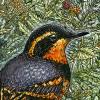

Join BirdNote tomorrow, November 30th!
Illustrator David Sibley and actor H. Jon Benjamin will face off in the bird illustration battle of the century during BirdNote's Year-end Celebration and Auction!
Birds in flocks almost invariably develop a pecking order. An alpha chicken can peck any other in the flock, and a beta chicken can peck all others but the alpha bird. Juncos and other small birds have a pecking order, too. The pecking order - or dominance hierarchy - of a flock of birds is usually this: males are dominant to females and adults are dominant to young birds. As a flock changes and birds come and go, the pecking order changes. If you feed backyard birds, you will likely notice this pecking order behavior in the flock.
Support comes from Sasquatch Books, announcing BirdNote the book, BirdNote notecards and a BirdNote journal, gifts for the bird-lover in one’s life.
BirdNote®
The Pecking Order
Adapted from a script by Dennis Paulson
This is BirdNote.
[Dark-eyed Juncos chipping]
If you like drama, watch the juncos at your bird feeder. These small, brown birds will get quite feisty around food. You’ll see one bird come in to grab a bite, then another darts over and pushes the first bird off. Or two birds may have a little tiff, with their tails flared out. What’s going on here?
[Dark-eyed Juncos chipping]
Birds in flocks almost invariably develop a literal pecking order — or, as scientists call it, a “dominance hierarchy.” The term comes from studies of chickens, which found that there was an alpha chicken that could peck any other chicken in the flock. A beta chicken could peck all others except the alpha. And so on. Think of the poor omega chicken, all the way at the bottom!
[Hens clucking]
With juncos, we know that males are dominant to females, and adults are dominant to young birds. So, the next time you see a group of birds, pay close attention to the dynamics among them. Who’s the alpha, and who’s the beta? Can you spot the omega? Do the birds flock together or work apart?
[Dark-eyed Juncos chipping]
You can learn about all kinds of birds when you come to our website, Birdnote.org. I’m Mary McCann.
###
Producer: John Kessler
Executive Producer: Sallie Bodie
Editor: Ashley Ahearn
Associate Producer: Ellen Blackstone
Assistant Producer: Mark Bramhill
Narrator: Mary McCann
Dark-eyed Junco feeding flock recorded by Martyn Stewart. Clucking hens recorded by C. Peterson.
BirdNote’s theme was composed and played by Nancy Rumbel and John Kessler.
© 2019 BirdNote December 2011 / 2019
ID# 122006peckKPLU dominance-02c






